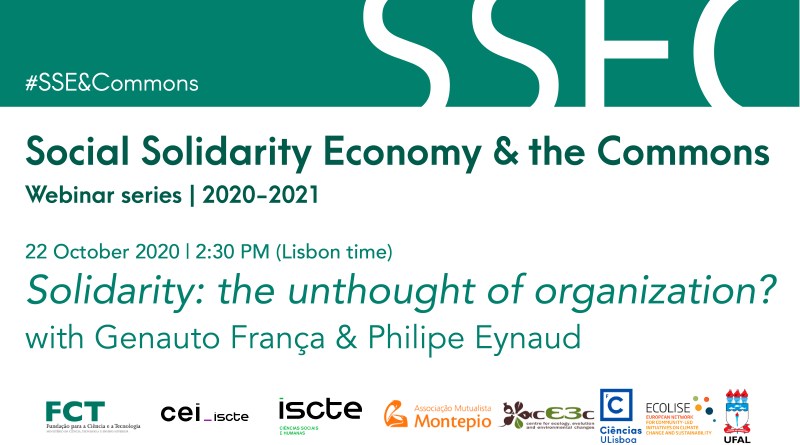CEI-Iscte is organizing a series of #SSE&Commons Webinars throughout 2020 and 2021, as a preparation for the third edition of the International Conference Social Solidarity Economy and the Commons, which is expected to take place in November 2021.
We will do our best to make sure that all the presentations in English will be translated to Portuguese and/or Spanish, and vice-versa.
The webinars are scheduled as follows:
October 22nd: “Solidarity: the unthought of organization?”
November 19th: “Participação democrática e as organizações de Economia Social e Solidária” (Democratic Participation and the Organizations of Social and Solidarity Economy)
December 17th: “Governança Democrática” (Democratic Governance)
January 21st: TBA
February 25th: TBA
March 25th: TBA
April 22nd: TBA
May 20th: TBA
June 17th: TBA
September 23rd: TBA
October 21st:TBA
The first webinar, dedicated to the topic “Solidarity: the unthought of organization?” will take place on 22 October at 2.30 PM (Lisbon time) via Zoom. The webinar will count on the presence of guest speakers Genauto Carvalho da França (Universidade Federal da Bahia) and Philipe Eynaud (Université Paris 1 – Panthéon Sorbonne) who will present the book “Solidariedade e organizações: pensar uma outra gestão” (Solidarity and organizations: thinking of another management) and Luciane Lucas dos Santos (Centro de Estudos Sociais, Universidade de Coimbra) and Gil Penha-Lopes (Faculdade de Ciências da Universidade de Lisboa) will be the discussants.
About the webinar
The contemporary world is facing a double peril: the abusive exploitation of natural resources endangers the balance of climate and biodiversity, and growing inequalities condemn our capacity to keep building society. These perils are mutually reinforcing and call without delay for the affirmation of a double solidarity: that which links humans and non-humans, and that which unites human beings. Such an effort cannot be decreed. It has to be organized. The social and societal transformation essential to our collective survival thus presupposes both another economy and another management.
Drawing on numerous citizen experiences that are being invented all over the world and on a historical and anthropological approach, the authors explore different ways of combining solidarity and organization. Solidarity-based management, management of the commons, management of the buen vivir are all avenues analyzed within a North-South dialogue in order to formulate the conceptual framework and the practical steps of a social and environmental transition.
Access the webinar here.
